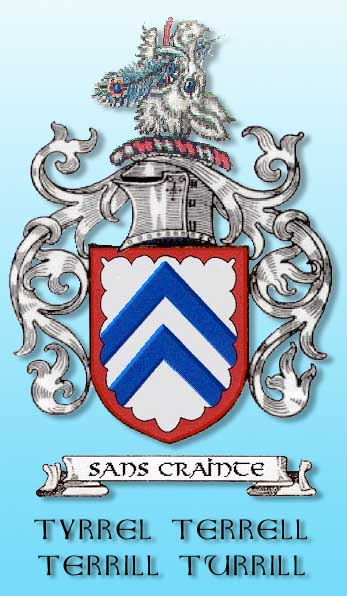From Wikipedia, the free encyclopedia
James Tyrrell (c. 1450
- May 6, 1502)
was an English knight,
a trusted servant of King Richard
III of England. His main claim to fame is that he is supposed to have
confessed to murdering the Princes
in the Tower on Richard's orders.
Tyrrell was the son of Sir William Tyrrell (c. 1415
- February 22, 1461)
and Margaret Darcy (c. 1425), married
in 1444. Like his father before him,
a loyal Yorkist, James was knighted in 1471.
He married Anne Arundell on March
9, 1483. They would later have
a son also named James Tyrrell.
James was in France in 1485 and
played no part in the Battle
of Bosworth Field which signalled the start of the Tudor's
reign.
In the following year, he returned to England and was pardoned by King
Henry
VII, who reappointed him governor of Guisnes
(in the English possession of Calais).
However, in 1501, Tyrrell lent his
support to Edmund
de la Pole, Duke of Suffolk, now the leading Yorkist claimant to the
English throne, who was in voluntary exile. When Henry heard of this, Tyrrell
was recalled, accused of treason,
and tortured. Thomas More
wrote that, during his examination, Tyrrell made his confession, implicating
two other men, but, despite further questioning, was unable to say where
the bodies were -- he claimed that they had been moved. He was beheaded
on May 6, 1502, and his confession,
if it happened, was never made public.
Although serious historians have never given much credence to the Tyrrell
story, Ricardians have exploited the confusion over the date of the pardon
in order to point the finger at King Henry.
[edit] Was
there anything sinister about Tyrrell's pardon?
Thomas B. Costain
and others have made much of Henry VII's pardoning Tyrrell in 1486, because
he seems to have done so twice: There are records of a "general pardon"
on
16 June (as was customary
for someone clearing up his records when leaving office) and another one
on
16 July. If that is not
some clerical error and there really were two pardons a month apart, the
question arises of what Tyrrell did during that month to make him want
another pardon. It has been suggested that Henry made a deal to pardon
Tyrrell and restore him to office if he would kill the princes, or that
he pardoned Tyrrell again and held the knowledge of his guilt in reserve
in case he ever wanted to use it against him later.
This explanation in itself begs several questions. Given that Henry
was ruthless and clever enough to murder the princes, the question arises
of why he would he have waited a whole year after his accession to do so,
and why he would he have selected a dyed-in-the-wool Yorkist as his instrument.
Archbishop John Morton
is said to have been the source of the information in Sir Thomas
More's The History of Richard III, which is where the story
of the "confession" of Tyrrell appears. According to More's account, King
Richard first sent a man named John Green to Robert
Brackenbury, keeper of the Tower, with a written order to kill the
two princes. When Brackenbury refused, Richard sent Tyrrell to Brackenbury
with a written order to deliver the keys to the Tower to Tyrrell for one
night, which he did. Tyrrell killed the boys that night, and Brackenbury's
priest moved the bodies from where Tyrrell buried them.
On the other hand, if Henry had murdered the princes, it is inexplicable
that he should have missed the opportunity of making Tyrrell his scapegoat
by publishing his confession at the time of his execution. More's account
suggests that Henry's reason for suppressing the confession was that he
feared that his earlier pardoning of Tyrrell would lead to his being blamed
for the murder. Morton, apparently the source of this information, was
dead by the time of Tyrrell's supposed confession, thus none of the content
of More's book was contemporary with the events described. It is now accepted
that More's book was an exercise in rhetoric
and was never meant to be taken as historical fact; however, for a while,
it became good propaganda for the Tudor
dynasty.
[edit] Legend
He is a participiant in the legend of the Horndon Worm from
East
Horndon which he slew using highly polished armour. Because of this
he has made an appearance in the
2000AD
story called
London
Falling. In this he is brutally killed by the character
Black
Shuck.
[edit] External
links

